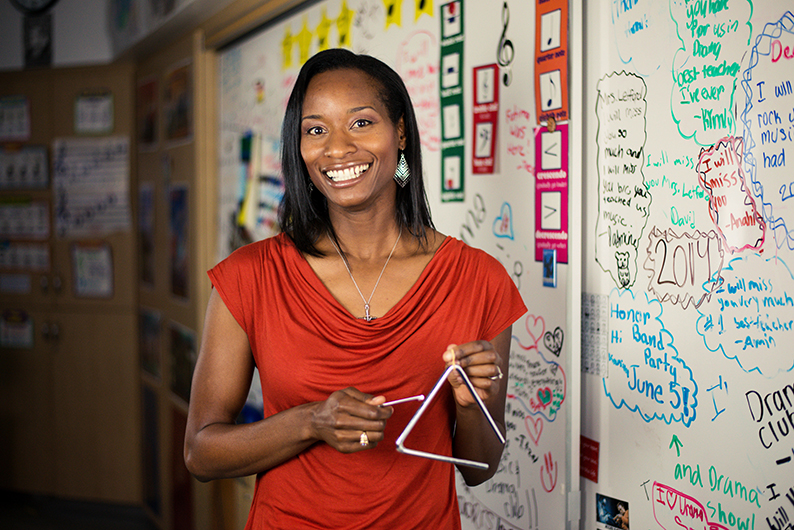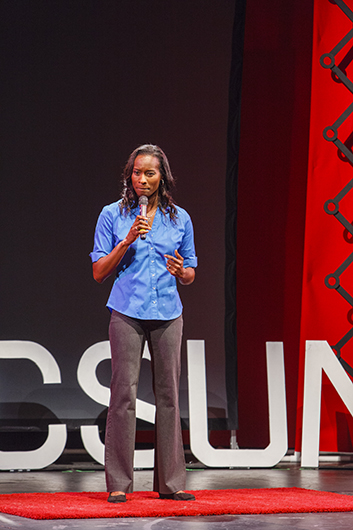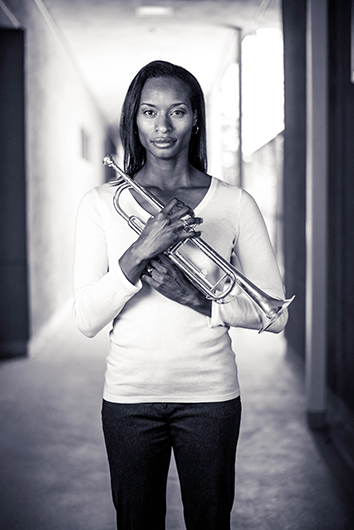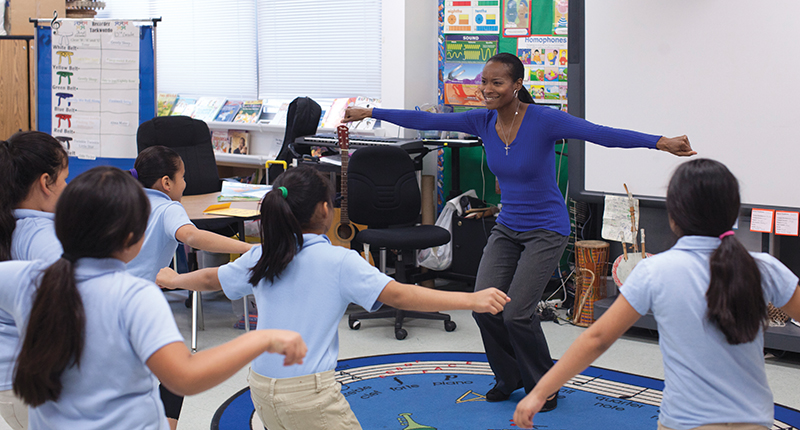When Genein Letford was in third grade, she was labeled a special education student because of her speech impediment; she stuttered when speaking.
Her mother insisted she learn to play an instrument, and she chose the trumpet, mainly because it was one of the least expensive instruments to rent.
She joined the school band in fourth grade and found her voice through music. Now a music teacher, Letford, 38, says the liberating feeling of self-expression and fluency transformed her life. “There was no stutter. There was no stammer. It was just me—able to say fluently, ‘I am here!’”
While she still sometimes struggles with her speech, you would not know it by listening to this District 52 Table Topics speech contest winner, TEDx speaker, keynote speaker, former college athlete, educator and life/finance coach. “She is inspiring, intelligent and has a way of capturing an audience that has you both in laughter and tears simultaneously,” says Brent Tippen, Associate Director of Public Affairs at Gilead Sciences Inc. John Murray, DTM, is Letford’s mentor in the Challengers Toastmasters club in Woodland Hills, California. At first, he explains, “She was reluctant to compete because of her speech impediment, but she accepted my gentle push. When she spoke at each level of competition [in the Table Topics contest], magic came out from within her. She reached for the stars and won the district championship.”
In any given week, Letford, CC, will teach students from ages 4 to 54. As music director at the charter school N.E.W. Academy Canoga Park, she created and teaches a music curriculum for children; older students take her arts integration course at California State University, Northridge (CSUN). She also coaches others in life/finance.
What’s the connection between the arts and finance? you might ask. Letford, the current president of the Challengers club, saw the relationship between creative literacy and financial literacy through personal experience. Strapped with credit-card and student-loan debt, she says she had to “get pretty creative” to pay off a 100,000 debt. It made her think about her students and how she might help them avoid financial disaster and give them the tools to thrive.
As Letford explains, “Financial literacy goes beyond basic finances into entrepreneurship skills.” And when she speaks of creative literacy, she includes not only the main forms of creative arts, she includes experiences in “innovation, imagination and creativity.” She believes that to harness the full power of the arts, one must experience four components: access to the arts, a connection through the arts, vulnerability to look within and, of course, knowledge. She recently gave a TEDxCSUN Talk about this topic. Watch her TEDx speech, “Brilliant Yet Broke: The Missing Tools Our Kids Need to Succeed."
In 2010, the Ron Clark Academy in Alpharetta, Georgia, recognized Letford’s teaching abilities by presenting her with the Great American Teacher Award. More recently, Letford was named 2015 California Charter Teacher of the Year (also known as the Hart Vision Award).
What was your childhood like?
Because of my stutter, I was really shy and quiet in elementary school. But once I picked up that shiny golden instrument, and finally mastered it, it was then that I found my voice. I would make up songs, learn songs from listening to them on the radio, and of course, learn the songs that our band teacher taught us. I just love to create, and music was the platform in which I chose to do so. Music saved my life.
What was life like before you played the trumpet?
We all want to express ourselves, and most of us do so early through our speech. But when speech isn’t fluent, expressing yourself can be frustrating. So before music, and before competing in track and field in high school, I felt that I couldn’t find my place in life. I wasn’t really good at anything. But once I put the trumpet in my hand, and once I stepped out onto the track to run, I finally found what actually brought me happiness.
Why did you choose to teach?
When I was 16, I remember watching my mother hold up a shelled walnut in front of a 3-year-old. The child knew the shell was hard but my mom cracked it in front of her, opened it, and gave her a piece of the nut. “You can eat it?” asked the little girl. The amazement in the girl’s eyes was indescribable. I never forgot that moment. Just being able to witness the process of discovery was a joy for me and I knew I wanted to be present for future discoveries as well.
You take your students to see the performing arts. Why?
I don’t think there’s just an achievement gap with students from various backgrounds, there’s also an exposure gap. Looking at my own life, my siblings and I were able to advance so much because we were exposed to different experiences early on, either through travel or in academics. I work hard to find grants and scholarships for my students to expose them to the performing arts and other academic opportunities. Most of them see their first classical symphony while in my class. This exposure increases their social capital of what’s actually possible and invites them into a world that I hope they’ll continue to choose to be a part of in their adulthood.
As I mention in my TEDx Talk, the arts allow you the opportunity to view things from multiple perspectives. To be able to connect the unconnected —and see and create what is not yet there—that is a priceless skill that students will need to have and deserve the exposure to.
Music and speech are obviously different methods of communication, but can you explain their similarities?
Music and speech are highly connected. Speech, intrinsically, is melodic. The manipulation of tone, pitch, cadence and tempo can effectively express meaning and intention more than words themselves. As we learn in Toastmasters, to master prosody and the melodic structures of speech is very important. Music is no different. But without words, we have only the use of musical elements such as tone, pitch, melody and the careful dance between sound and silence. The brain is wired to hear the message of music even if there are no words.




Tell us about your mentorship program, Alumni360.
I ask my mentorship students, What are you good at, What do you want to create? What are you passionate about? And can you use entrepreneurial strategies to birth those passions into existence? It was these questions that compelled me to start Alumni360, a nonprofit mentorship program for middle and high school students from low-income backgrounds. It’s an entrepreneur arts summer camp, and we work directly on the intersection of these two literacies to teach them initiative and confidence.
How did you overcome your speech impediment?
I can’t really say that I’ve overcome it, but I have successfully employed strategies and skills to minimize it in certain circumstances. It’s weird; this stutter that has seemingly been my arch-enemy for so long has now become my partner in inspiring others to reach their full potential. If I can walk onto that red circle and speak for 15 minutes about an idea worth spreading, then anyone with a stutter, or not, can do the same. So I haven’t really overcome my stutter, I just see it differently. It’s now my superpower; it’s now my launch pad.
What is your key message to your students?
I want my students, or anyone I meet, to understand that their story has power and value. I want them to see their story as a tapestry—an embroidered quilt of experiences, good and bad—that will equip them to live their best life. For years, I was ashamed of the way I spoke and ashamed that I couldn’t communicate effectively. But once I reframed how I saw my experience, it became the thing I use to inspire others. I want my students to look at every experience that they have had, every struggle that they persistently endured, and see them as strengthening cords in their quilt of life.
 Letford teaches the concept of a steady beat through dance to prepare her students to begin playing musical instruments.
Letford teaches the concept of a steady beat through dance to prepare her students to begin playing musical instruments.
Where does inspiration come from, and how do you ignite it in others?
My inspiration comes from my faith and my experiences, and the truth—the vulnerable truth— that resides within them. When I deliver my speeches I give my audience a door to walk through—a door through which they can see themselves in their own journey parallel to mine. I also tap into the “potential.” We all have our own pathways in life but the power of potential is universal.
What’s the secret to connecting with an audience?
As Charlie Parker, the American jazz saxophonist and composer, said, “If you don’t live it, it won’t come out of your horn.”
An audience knows when you’re fake. They know when you’re talking about something that you actually have never been through or have no connection with. My most powerful speeches are based on the experiences that I’ve gone through myself. Being financially broken, and climbing out of 100,000 of debt, I know how to pull myself back to those times and connect with audience members who might be struggling with debt. Dealing with a speech impediment and trying to find my voice, I give my audience the chance to connect with me (even if they don’t have a speech impediment, they’re still struggling with something that they’re trying to overcome). It’s the vulnerability of acknowledging my weaknesses and saying I know how they feel because I’ve been there too.
What advice do you have for those who struggle with public speaking?
It’s very difficult to get good at something that you never do. So even if you’re doing it badly or if you’re doing it with fear, still do it. A trick that I use that’s actually based on research is I tell myself I am excited to speak as opposed to thinking I’m nervous or I’m afraid. The physical reactions to fear and excitement are the same: heart palpitations, sweaty palms, dilated pupils. But if you label your emotion as excitement as opposed to fear, you are more likely to have a better outcome. It’s all psychology.
My second tip is to remember it’s not about you. This is how I got through my TEDx Talk, remembering it’s about advocating for students. You are a conduit of information, transference of inspiration and the messenger of love. When I remember why I am speaking—for the betterment of the people in the room and all the people they’re attached to—it makes me focus on what really is important: my goal of making sure people live their best life.



 Previous
Previous
 Previous Article
Previous Article